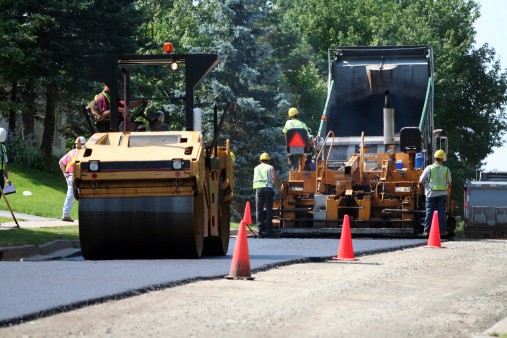Exploring the Various Kinds Of Asphalt Paving and Their Benefits
From the durable qualities of Hot Mix Asphalt to the environment-friendly characteristics of Recycled Asphalt Sidewalk, understanding these choices can significantly affect task end results. Technologies such as Warm Mix Asphalt and Porous Asphalt introduce additional layers of effectiveness and sustainability.
Hot Mix Asphalt
When taking into consideration the most efficient leading options, hot mix asphalt (HMA) stands out as a top option for many applications (paving). HMA is a flexible leading product understood for its longevity, flexibility, and general performance. It is created by heating asphalt binder and integrating it with accumulations at high temperature levels, making sure an uniform mixture that can endure various environmental problems
Among the primary benefits of HMA is its ability to provide a smooth, skid-resistant surface, improving safety and security for automobiles and pedestrians alike. Furthermore, HMA exhibits superb resistance to contortion, making it optimal for high-traffic locations such as highways and parking area. Its versatility to various environments further adds to its extensive usage.
The installation process of HMA is relatively fast, permitting effective job conclusion with very little interruption to traffic. Furthermore, it can be recycled, minimizing waste and promoting sustainability within the building and construction industry. Generally, warm mix asphalt continues to be a top choice for leading experts because of its durable performance characteristics and lasting cost-effectiveness, making it a trustworthy service for numerous facilities requirements
Warm Mix Asphalt
Warm mix asphalt (WMA) provides an ingenious choice to hot mix asphalt, giving comparable benefits while calling for reduced production temperatures. Commonly produced at temperature levels between 190 ° F and 250 ° F, WMA modern technology reduces energy usage and greenhouse gas emissions during manufacturing, making it a much more eco pleasant choice.
Among the vital benefits of WMA is its extended workability period. The lower temperature levels permit for much more effective transport and placement, particularly in cooler weather. This adaptability can result in enhanced compaction and overall resilience of the asphalt surface. Additionally, WMA can be used in various applications, varying from highways to domestic driveways, without jeopardizing efficiency.

The consolidation of ingredients or modified binders in WMA adds to its boosted residential or commercial properties, making certain that it satisfies or goes beyond efficiency requirements. WMA's reduced thermal influence throughout production can lower the likelihood of damages to the surrounding setting, making it an appealing selection for sustainable paving methods.
Cold Mix Asphalt
Cold mix asphalt is a flexible leading remedy generally utilized for temporary repairs and low-traffic areas. This kind of asphalt is produced at ambient temperatures, making it a hassle-free selection for fast solutions and jobs where conventional warm mix asphalt might not be feasible. The blend commonly contains asphalt binder, aggregate, and additives, allowing it to remain practical for an extended duration.
Among the main benefits of chilly mix asphalt is its convenience of application. It can be installed pop over to this site without customized devices, making it accessible for smaller sized service providers and DIY enthusiasts. In addition, cool mix can be used in various weather, which is specifically useful for urgent fixing demands.

Cold mix asphalt is additionally economical, as it enables for economical repair services without compromising top quality. Its versatility makes it appropriate for covering pits, loading cracks, and resurfacing driveways. Although it might not supply the exact same long-term sturdiness as hot mix asphalt, its fast application and flexibility make it an excellent choice for temporary options and low-traffic applications. Generally, chilly mix asphalt stays a useful option in the asphalt paving landscape.
(open link)
Permeable Asphalt
Permeable asphalt is an innovative paving option made to improve stormwater monitoring and lower surface area runoff. This type of asphalt includes a distinct framework that integrates interconnected voids, allowing water to permeate with the surface and right into the underlying layers. By promoting all-natural drain, permeable asphalt helps alleviate the risk of flooding and reduces the concern on metropolitan stormwater systems.
One of the main advantages of permeable asphalt is its capacity to improve water high quality. As stormwater filters through the sidewalk, toxins and debris are trapped, minimizing the number of impurities that enter local rivers. This adds to much healthier ecosystems and supports conformity with ecological policies.
Furthermore, porous asphalt can boost the durability of the sidewalk itself. By lowering water accumulation on the surface area, it lessens the capacity for freeze-thaw cycles that can cause breaking and deterioration. The minimized requirement for typical stormwater monitoring framework can result in expense savings for municipalities and programmers.
Recycled Asphalt Sidewalk
(read the post)Recycled asphalt pavement (RAP) represents a sustainable strategy to street construction and maintenance that benefits both the environment and the economic situation. By reusing existing asphalt products, RAP reduces the demand for new raw products, which in turn preserves natural deposits and lessens environmental impact. This technique lowers energy consumption and greenhouse gas exhausts linked with the manufacturing of new asphalt.
The unification of RAP right into new pavement combinations can additionally bring about considerable expense financial savings. Specialists can utilize recycled materials to minimize general job expenses, making it a financially feasible choice for municipalities and exclusive programmers alike. Furthermore, RAP offers equivalent performance characteristics to virgin asphalt, making certain resilience and long life in road surfaces.
RAP's convenience enables it to be made use of in various applications, including freeways, parking area, and household driveways. By improving the architectural integrity of existing sidewalks, RAP adds to boosted security and smoothness of roads.
Conclusion
Warm Mix Asphalt stands out in resilience and quick installation for high-traffic locations, while Warm Mix Asphalt enhances sustainability with lowered power consumption. Cold Mix Asphalt offers as an affordable choice for urgent repair work, Porous Asphalt successfully takes care of stormwater, and Recycled Asphalt Sidewalk advertises environmental obligation.